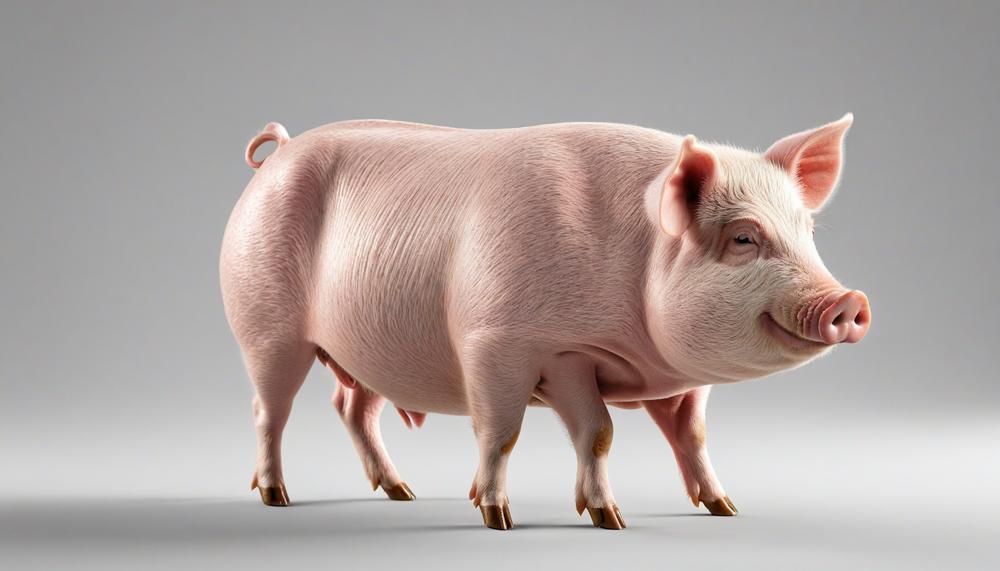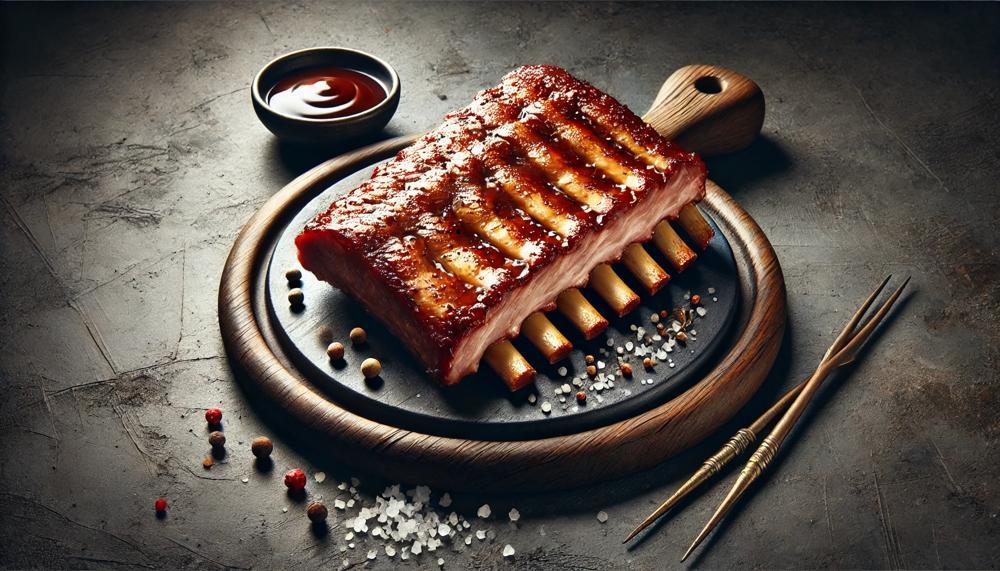Is your pork smelling like vinegar? If so, you might initially worry, but let’s unpack what this could mean. The answer to whether this is normal is: not really. Pork shouldn’t naturally emit a vinegar-like odor, and such a smell could indicate a few underlying issues.
Here’s what you need to know:
- Preservation Methods: Sometimes, pork can have a vinegary smell if it has been preserved or treated with vinegar-based solutions. This is more common in pork products like ham or sausages rather than fresh cuts.
- Spoilage: A sour or vinegar-like smell can also be a sign of spoilage. When pork starts to go bad, it can give off an acidic scent similar to vinegar due to bacterial growth.
- Packaging Process: In some cases, the packaging process can cause a vinegar-like smell. The interaction between the meat’s juices and the packing material, especially in vacuum-sealed packs, can create a distinct odor once the package is opened.
- Immediate Action: If your pork smells like vinegar, it’s safest to avoid eating it. Check for other signs of spoilage like slimy texture or discoloration. When in doubt, it’s better to be safe and discard the meat.
In brief, while some meat treatments might cause a slight vinegar scent, a strong vinegar smell is likely a spoilage indicator. Always trust your senses when assessing meat quality. Stay tuned for more insights on keeping your pork fresh and delicious.
Contents
- 1 Most Frequently Asked Questions Related to Pork Smells Like Vinegar
- 2 What Does Pork Smell Like When It Goes Bad?
- 3 Does Pork Have a Funny Smell?
- 4 How to Tell if Pork Steaks are Bad?
- 5 How Long To Store Pork Meat in the Freezer Safely to Prevent Vinegar Smell?
- 6 What Happens if You Eat Pork That Smells Like Vinegar?
- 7 How to Prevent Pork from Smelling like Vinegar?
- 8 Conclusion
Most Frequently Asked Questions Related to Pork Smells Like Vinegar
When pork smells like vinegar, it often raises alarms for both novice and seasoned grill masters. Below are the most frequently asked questions and their straightforward answers:
| Question: | Answer: |
| Why does my pork smell like vinegar? | Pork can smell like vinegar due to bacterial growth that produces acetic acid, especially if the meat has been improperly stored or is beginning to spoil. Ensure the pork is fresh and well-refrigerated. |
| Is it safe to eat pork if it smells like vinegar? | Consuming pork that smells like vinegar can be risky as it may indicate spoilage. If the sour smell is strong, it’s safer to discard the meat to avoid potential foodborne illness. |
| Can I remove the vinegar smell from pork? | It’s challenging to remove a vinegar-like smell from pork. If the smell is mild, cooking thoroughly might help, but it’s crucial to ensure the meat is still safe to eat. |
| What should I do if my pork smells off? | If your pork has an off smell, especially a sharp, acidic one like vinegar, the best course of action is to discard it to prevent any health risks associated with spoiled meat. |
| How can I prevent my pork from smelling like vinegar? | To prevent your pork from developing a vinegar-like smell, store it in the refrigerator or freezer immediately after purchase and use it within its sell-by date. Always keep meat wrapped securely to avoid contamination. |
These answers aim to address concerns clearly and help ensure a safe and enjoyable grilling experience.
What Does Pork Smell Like When It Goes Bad?
When pork goes bad, it emits a distinct and unpleasant odor that can be best described as sour or similar to ammonia.
This is a telltale sign that the pork has been affected by pathogenic bacteria, which produce gases and compounds responsible for the foul smell. Below, I’ve detailed the key characteristics of bad pork odor to help you identify it easily:
| Odor Description | Similar To | Cause |
| Sour | Old milk, sour cream | Bacterial growth |
| Ammonia-like | Cleaning agents | Chemical breakdown of proteins |
| Rotten | Decaying organic matter | Advanced decomposition |
For grill enthusiasts, recognizing this sour or ammonia-like odor in pork is crucial before cooking. Cooking spoiled pork is not recommended as it can pose serious health risks, regardless of the temperature it reaches. If your pork exhibits these smells, it is best to discard it immediately to ensure safety and quality in your grilling endeavors.
Moreover, keeping pork at the right temperature and using it within recommended time frames will help prevent these issues, maintaining the integrity of your dishes.
Does Pork Have a Funny Smell?
No, fresh pork should not have a funny smell. When properly stored and unspoiled, pork will have a mild, almost neutral scent. A funny or sour smell is a clear indicator that the pork has spoiled and should not be consumed.
Fresh pork’s scent can be best described as slightly metallic due to its iron content, but it should never be off-putting or strongly odorous. For grill enthusiasts eager to ensure the quality of their meat, understanding the normal scent of pork is crucial. Here’s what to look out for:
Freshness Check:
- Colour: Fresh pork should have a pinkish hue with white fat marbling.
- Texture: It should be firm to the touch and spring back when pressed.
Odour Assessment:
- Neutral Smell: No strong odours should emanate from the meat.
- Spoilage Signs: A sour or ammonia-like smell indicates spoilage.
Handling Vacuum-Packed Pork:
- Often, vacuum-packed pork can emit an acidic smell when the package is first opened. This is due to the encapsulation of liquid that might have an acidic aroma but is not necessarily a sign of spoilage.
Here’s a simple table to help identify if your pork is good to grill:
| Feature | Good Pork | Bad Pork |
| Smell | Mild or neutral | Sour, ammonia-like |
| Texture | Firm and dry | Slimy |
| Colour | Pink with white fat | Grey or greenish |
In conclusion, pork should be sniffed prior to grilling to ensure it is fresh and safe to consume. If in doubt, it’s better to err on the side of caution and discard any pork with an unusual smell. Fresh, quality pork will enhance the flavour of your dishes without any funny smells interfering with your grilling experience.
How to Tell if Pork Steaks are Bad?
Determining if pork steaks have gone bad is essential to ensure both the quality of your meal and your safety. Here’s how to identify spoiled pork steaks:
- Smell: Fresh pork should have a mild, not overly pungent scent. Spoiled pork exudes a sour or ammonia-like odor that is quite pronounced. Trust your nose—if the pork smells off, it’s best to err on the side of caution and throw it away.
- Texture: Feel the pork steak. Fresh pork should be firm to the touch. If your pork steak feels slimy or sticky, it’s a clear indicator of spoilage. The presence of a slimy film is a sign that the pork should not be consumed.
- Color: Look at the color of the pork steak. Fresh pork generally has a blush pink or pale red color. If you observe any grey, green, or black spots, this suggests significant decay, and such pork steaks should not be consumed.
How Long To Store Pork Meat in the Freezer Safely to Prevent Vinegar Smell?
To ensure pork meat stays fresh and devoid of a vinegar smell when frozen, it is vital to store it properly and within the recommended time frame. Here’s the direct answer:
Pork meat can be stored safely in the freezer for up to 6 months. This timeframe helps prevent the development of off odors and flavors, including the undesirable vinegar smell, which can result from prolonged freezing and oxidation processes.

For those grilling enthusiasts eager to ensure their pork remains in peak condition, here’s a detailed breakdown of how to store your pork properly in the freezer:
- Wrap Well: Use airtight packaging such as heavy-duty freezer bags, thick plastic wrap, or aluminum foil. This prevents air from getting in and causing freezer burn.
- Label Your Packages: Note the date on the packaging before placing it in the freezer. This helps track how long the pork has been stored.
- Temperature Matters: Keep your freezer at a constant temperature of -18°C (0°F) or lower to maintain the meat’s quality.
Following these steps will help ensure that your pork remains fresh, tasty, and safe to cook and eat after freezing, maintaining its quality without any compromise in taste or safety.
For further understanding, the following table provides an easy reference for storing different types of pork cuts in the freezer:
| Pork Cut | Recommended Storage Time | Optimal Freezer Temperature |
| Pork Chops | 4-6 months | -18°C (0°F) |
| Pork Loin | 6 months | -18°C (0°F) |
| Ground Pork | 3-4 months | -18°C (0°F) |
Storing pork correctly not only ensures safety and quality but also maximizes your enjoyment when it’s time to grill.
What Happens if You Eat Pork That Smells Like Vinegar?
Consuming pork that smells like vinegar is risky because the odor often indicates spoilage due to bacterial growth. This bacteria can produce toxins that are not destroyed by cooking, posing health risks such as food poisoning.
Symptoms might include stomach pain, nausea, vomiting, and diarrhea. It is critical to avoid eating spoiled meat to ensure your health and safety.
To give you a clearer idea, here is a table outlining the risks associated with eating spoiled pork:
| Symptom | Cause | Prevention |
| Stomach Pain | Consumption of bacterial toxins | Ensure pork is fresh and smells neutral before cooking |
| Nausea and Vomiting | Body’s reaction to spoilage bacteria | Store pork at -18°C or below and use within 6 months |
| Diarrhea | Intestinal irritation from toxins | Avoid consuming any meat that smells off or sour |
Always check the scent and appearance of pork before preparing it for the grill. If it emits a vinegar-like smell, it is best to err on the side of caution and discard the meat.
How to Prevent Pork from Smelling like Vinegar?
To prevent pork from smelling like vinegar, it’s essential to manage its storage, preparation, and cooking processes effectively. Here are some steps to ensure your pork remains fresh and free of unwanted odors, especially when you’re planning to grill:
- Proper Storage: Keep pork in its original packaging until you’re ready to use it. Store it in the coldest part of your refrigerator and ensure it’s used within 3-5 days of purchase. For longer storage, freeze it in airtight containers.
- Cleaning Before Cooking: If the pork has a slight vinegar smell or a slimy texture when you unpack it, rinse it thoroughly under cold water. Pat it dry with paper towels before seasoning or marinating.
- Mindful Marinating: Use fresh ingredients for marinades. If vinegar or acidic components are used, limit the marinating time to a few hours to avoid the pork absorbing too much vinegar scent.
- Cooking Technique: Ensure the pork is cooked at the right temperature. Overcooking can amplify any unpleasant odors, while undercooking might not effectively eliminate them. Grilling pork should typically be done over medium heat to ensure even cooking without charring.
Conclusion
If your pork exudes a vinegar scent, it’s wise to handle the situation with care. This odor typically doesn’t belong to fresh pork and can be a red flag for potential issues. It’s essential to understand the possible causes and the risks involved.
Pork can develop a vinegary smell due to various reasons, such as preservation methods involving vinegar, spoilage from bacterial growth producing acidic compounds, or reactions from packaging materials in vacuum-sealed products. This smell often serves as a warning sign that the pork may not be safe to consume. Fresh pork should have a mild, neutral scent; any deviation, particularly a sharp, acidic aroma, suggests that the meat may be past its prime.
To ensure safety, examine other spoilage indicators like texture changes or discoloration. If any signs are present, it’s best to discard the pork. To prevent future incidents, store pork properly by keeping it refrigerated or frozen within recommended timeframes and use it before the sell-by date.
In short, trust your senses. A vinegar-like smell in pork isn’t something to overlook.






